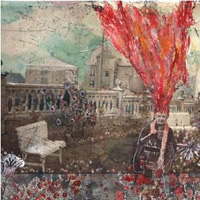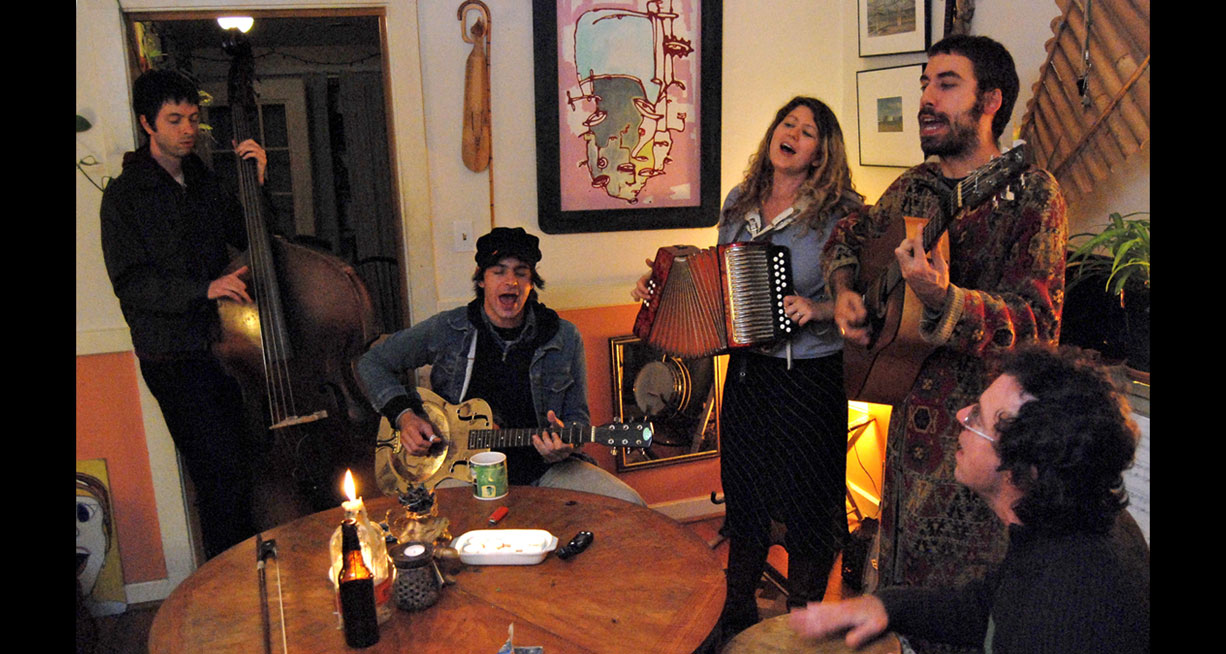Fire on Fire: “Hartford Blues”
[audio:https://alarm-magazine.com/wp-content/uploads/2010/10/Fire_on_Fire_Hartford_Blues.mp3|titles=Fire on Fire: “Hartford Blues”]
Making music isn’t easy. Just ask Chriss Sutherland — co-singer, co-songwriter, and multi-instrumentalist of Portland, Maine’s alt-folk quintet Fire On Fire. For more than a decade, the five-piece has lived together in a big blue house in New England making music. For years, the band put forth all of its efforts in the “art-punk-prog-chaos” sextet Cerberus Shoal. And for years, its members toured laboriously throughout North America and Europe, depleting themselves of almost every scrap of energy that they conjured. And, Sutherland feels, when all was said and done, there was little to show for the enormous amount of work being put forth.

In the meantime, though, the members began experimenting with other types of instruments: acoustic guitars, banjos, a stand-up bass, accordions, djembes, tamburitzas, and other obscure tools that have been around for centuries — things that wouldn’t necessarily have catered to Cerberus Shoal’s sound. Random jam sessions casually began taking place in the house, starting from a person or two in the kitchen and eventually garnering input from everyone. Living together afforded the band many opportunities for practices like these, and eventually a new style was conceived. A new life was breathed into Sutherland and his bandmates, giving birth to Fire On Fire and inevitably leading to the disintegration of Cerberus Shoal.
Sutherland is happy with the shift in musical focus. “Cerberus Shoal was a band that tried really hard,” he says. “And we were looking for something that we wouldn’t have to try so hard at.” Likewise, each member moved in the same direction subconsciously. “We never really discussed it,” Sutherland says of the change. “It just kind of happened. We were just kind of tired [with Cerberus Shoal]. We were looking for something lighter, easygoing, more natural.” And so the “more natural” sound gravitated towards a more accessible, more traditional form of music than the band had strived for in the past.
The group’s tortured, backwoods folk hymns, blended with ghostly voices and layers of sad-eyed strings, break your heart and make you smile at the same time.
The band also approached songwriting in a different way. “One person writes a song,” Sutherland says, “and then everyone supports that person with their own input — whether it’s by picking up an instrument or lending a voice.” According to him, this works much better than the process of Cerberus Shoal, with six different ideas coming from all over, bumping against each other at countless band practices. It’s one of the things that helped propel Fire On Fire out of the kitchen and into the recording studio.
On the group’s first proper full-length, The Orchard (Young God), the sound that it sought is quite apparent, but the outcome is anything but ordinary. At times, Fire On Fire’s gorgeously rendered music comes off as haunted. With a wide range of instrumentation peppering each song, along with a harmonized choir of vocals mixing in, the band soldiers through song after song of rich and spooky indie/folk/bluegrass. With clanging banjos, eerie harmoniums, picking mandolins, and seafaring accordions — among other instruments — the group can be found somewhere between Hank Williams, Sr. and The Arcade Fire. And though that gap might seem cosmic, Fire On Fire fills the void quite fully.
The group’s tortured, backwoods folk hymns, blended with ghostly voices and layers of sad-eyed strings, break your heart and make you smile at the same time. Each track oozes with harrowing tales of woe, love, and loss — the lyrics spilling onto a countertop of intricate melody and harmony. The album feels true to its form; it feels like what Sutherland and his band had sought — something unflinchingly natural, something that gets back to music’s roots.
Understandably, though, Fire On Fire is not ready to throw caution to the wind and go all-out and tour worldwide like its members did with Cerberus Shoal. “[Fire On Fire] is very timid to put a lot of energy into something that might not be a payback — whether it’s emotionally, spiritually, or financially,” Sutherland says. Some of the members are balancing careers outside of Fire On Fire, and two of the members — Colleen Kinsella and Caleb Mulkerin — are facing the challenges of parenthood together. But even if concertgoers miss their friendly faces, Cerberus Shoal’s breakup, if anything, was a blessing in disguise. Had it never happened, we probably would never hear the beautiful, sad, and haunted musings of Fire On Fire.
In many ways, Fire On Fire is a new beginning for the bruised and battered members of Cerberus Shoal. It’s just like starting over again, according to Sutherland. “We’re just figuring out what to do and how to do it,” he says. And if The Orchard is any indication, it seems that the group’s efforts will be worth it this time around. After years of looking, the band has finally found itself — and its members have found a home in each other.

